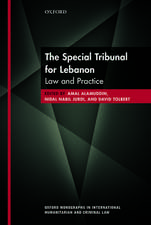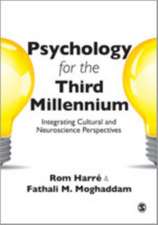From the Terrorists' Point of View: What They Experience and Why They Come to Destroy: Praeger Security International
Autor Fathali M. Moghaddamen Limba Engleză Hardback – 29 iun 2006 – vârsta până la 17 ani
Din seria Praeger Security International
- 18%
 Preț: 334.19 lei
Preț: 334.19 lei - 8%
 Preț: 335.53 lei
Preț: 335.53 lei - 34%
 Preț: 376.10 lei
Preț: 376.10 lei - 46%
 Preț: 443.64 lei
Preț: 443.64 lei - 29%
 Preț: 240.11 lei
Preț: 240.11 lei - 8%
 Preț: 304.56 lei
Preț: 304.56 lei - 34%
 Preț: 373.82 lei
Preț: 373.82 lei - 19%
 Preț: 412.79 lei
Preț: 412.79 lei - 19%
 Preț: 338.42 lei
Preț: 338.42 lei - 18%
 Preț: 335.62 lei
Preț: 335.62 lei - 27%
 Preț: 377.35 lei
Preț: 377.35 lei - 27%
 Preț: 376.75 lei
Preț: 376.75 lei - 18%
 Preț: 336.46 lei
Preț: 336.46 lei - 18%
 Preț: 321.73 lei
Preț: 321.73 lei - 27%
 Preț: 384.51 lei
Preț: 384.51 lei - 18%
 Preț: 320.50 lei
Preț: 320.50 lei - 18%
 Preț: 320.50 lei
Preț: 320.50 lei - 18%
 Preț: 321.35 lei
Preț: 321.35 lei - 24%
 Preț: 420.54 lei
Preț: 420.54 lei - 14%
 Preț: 335.99 lei
Preț: 335.99 lei - 18%
 Preț: 355.82 lei
Preț: 355.82 lei - 18%
 Preț: 319.83 lei
Preț: 319.83 lei - 18%
 Preț: 334.28 lei
Preț: 334.28 lei - 32%
 Preț: 354.48 lei
Preț: 354.48 lei - 14%
 Preț: 335.14 lei
Preț: 335.14 lei - 38%
 Preț: 405.98 lei
Preț: 405.98 lei - 40%
 Preț: 571.34 lei
Preț: 571.34 lei - 18%
 Preț: 321.85 lei
Preț: 321.85 lei - 18%
 Preț: 323.25 lei
Preț: 323.25 lei - 18%
 Preț: 253.28 lei
Preț: 253.28 lei - 40%
 Preț: 571.50 lei
Preț: 571.50 lei - 14%
 Preț: 333.72 lei
Preț: 333.72 lei - 18%
 Preț: 301.73 lei
Preț: 301.73 lei - 19%
 Preț: 352.96 lei
Preț: 352.96 lei - 26%
 Preț: 387.80 lei
Preț: 387.80 lei - 18%
 Preț: 302.77 lei
Preț: 302.77 lei - 14%
 Preț: 333.91 lei
Preț: 333.91 lei - 17%
 Preț: 325.80 lei
Preț: 325.80 lei - 24%
 Preț: 338.58 lei
Preț: 338.58 lei - 34%
 Preț: 414.73 lei
Preț: 414.73 lei - 18%
 Preț: 354.30 lei
Preț: 354.30 lei - 29%
 Preț: 254.29 lei
Preț: 254.29 lei - 18%
 Preț: 354.11 lei
Preț: 354.11 lei - 18%
 Preț: 334.38 lei
Preț: 334.38 lei - 14%
 Preț: 302.68 lei
Preț: 302.68 lei - 18%
 Preț: 322.97 lei
Preț: 322.97 lei - 27%
 Preț: 376.50 lei
Preț: 376.50 lei - 27%
 Preț: 322.81 lei
Preț: 322.81 lei - 27%
 Preț: 382.91 lei
Preț: 382.91 lei - 18%
 Preț: 320.87 lei
Preț: 320.87 lei
Preț: 340.02 lei
Preț vechi: 446.90 lei
-24% Nou
Puncte Express: 510
Preț estimativ în valută:
65.07€ • 70.66$ • 54.66£
65.07€ • 70.66$ • 54.66£
Carte tipărită la comandă
Livrare economică 22 aprilie-06 mai
Preluare comenzi: 021 569.72.76
Specificații
ISBN-13: 9780275988258
ISBN-10: 0275988252
Pagini: 192
Ilustrații: black & white illustrations
Dimensiuni: 156 x 235 x 22 mm
Greutate: 0.47 kg
Editura: Bloomsbury Publishing
Colecția Praeger
Seria Praeger Security International
Locul publicării:New York, United States
ISBN-10: 0275988252
Pagini: 192
Ilustrații: black & white illustrations
Dimensiuni: 156 x 235 x 22 mm
Greutate: 0.47 kg
Editura: Bloomsbury Publishing
Colecția Praeger
Seria Praeger Security International
Locul publicării:New York, United States
Notă biografică
Fathali M. Moghaddam is Professor of Psychology at Georgetown University. An internationally known, Iranian-born and British-educated psychologist, he has extensive consulting and research experience regarding intergroup conflict and terrorism. He previously held positions with McGill University and the United Nations. Moghaddam taught and researched in Iran for five years immediately following the 1978-79 revolution. He is the author of numerous books, including his forthcoming volume Multiculturalism, Democracy and Intergroup Relations (2007). Moghaddam was awarded the 2007 Lifetime Achievement Award from the Society for the Study of Peace, Conflict and Violence, Division 48 of the American Psychological Association.
Cuprins
PrefaceWhy Consider the Terrorists' Point of View?Identity Needs and GlobalizationThe Staircase to TerrorismGround Floor: Growing Dissatisfaction Among the MultitudesFirst Floor: How Do We Fight This Unfair System?Second Floor: Those Americans Are to Blame!Third Floor: The Ends Justify the MeansFourth Floor: It's Us against ThemFifth Floor: This "Heroic" Act Will Improve the WorldContextualized Democracy as a Solution to TerrorismSelected Bibliography
Recenzii
In this book, Moghaddam, the author of numerous textbooks on social psychology, explains to Americans that contemporary Islamic terrorists are not crazy or suicidal. They become terrorists because their repressive societies allow their need for identity to be fulfilled only through such relatively autonomous Islamic organizations as terrorist groups. The failure to allow individual rights and individual development interacts with the dead history cultures to disseminate despair. Moghaddam also shows that while the closed Islamic societies shape conditions for developing the terrorist commitment to destruction, U.S. policy in the region, supporting despotic governments and Israel's repression of Palestine, has made the United States an inevitable target. He asserts that military efforts will not defeat Middle Eastern terrorism until U.S. policy modifies its support of current oppressive governments and more intelligently supports democratic conditions in the Middle East. The combination of theoretical analysis and concrete examples sometimes makes for awkward and dense prose, but the importance of the topic and Moghaddam's expertise in the psychology of individuals and societies along with his familiarity with Iran and Iraq make this a useful addition to libraries.
[I]t is refreshing to have a book that examines what makes Islamist fundamentalist terrorism tick. . . . In terrorism, as in so many other security threats, understanding one's enemy is the critical foundation for effectively dealing with the manifestations of the threat. From the Terrorists' Point of View is a helpful resource in this regard, and it is highly recommended for anyone concerned with today's terrorist threat.
This book From the Terrorists' Point of View: What They Experience and Why They Come to Destroy is required reading for the layperson who asked after 9/11, 'Why do they hate us?' and 'Why would anyone commit suicide to kill people he doesn't even know?'
Moghaddam, professor of psychology at Georgetown, challenges both the religious and the socioeconomic paradigms of understanding terrorism in this compelling analysis.
The author is very clear on one point upon which we all agree: terrorism, regardless of its motive, cannot be justified. But he is also very clear with the core of his thesis-that a better understanding of terrorism and how to end it can only be achieved when one is able to see the world from the terrorists' point of view . . . [t]his controversial position is precisely what makes From the Terrorists' Point of View an interesting book.
Focusing on terrorism originating in the Islamic world, Moghaddam proposes a staircase model for why individuals become involved with terrorist organizations and the process by which they come to carry out terrorist acts. His model is rooted in the concept that the Islamic world is undergoing a crisis of identity in a globalizing world in which all avenues of opposition have been confined to the arena of Islamic fundamentalism. From these initial conditions, he lays out a staircase model of identity formation for how individuals proceed towards terrorism. He recommends combating this process through the promotion of contextualized democracy that will allow for Muslims to address their political concerns while still retaining an authentic identity.
While college-level students of world history and terrorism-related issues will be the most likely audience for the scholarly analysis in From the Terrorists' Point of View: What They Experience and Why They Come to Destroy, it'd be a shame not to recommend this outside the college-level collection for general interest readers. It argues that terrorism arises from an identity crisis in Islamic societies, and uses the author's own experiences of life in that world, along with his psychological degree, to analyze the psyche and motivations of the terrorist mind. Think this holds only implications for understanding individuals? Think again: chapters draw essential links between this understanding and the U.S. strategies for abolishing terrorism-strategies that may be wrong given Moghaddam's insights.
[I]t is refreshing to have a book that examines what makes Islamist fundamentalist terrorism tick. . . . In terrorism, as in so many other security threats, understanding one's enemy is the critical foundation for effectively dealing with the manifestations of the threat. From the Terrorists' Point of View is a helpful resource in this regard, and it is highly recommended for anyone concerned with today's terrorist threat.
This book From the Terrorists' Point of View: What They Experience and Why They Come to Destroy is required reading for the layperson who asked after 9/11, 'Why do they hate us?' and 'Why would anyone commit suicide to kill people he doesn't even know?'
Moghaddam, professor of psychology at Georgetown, challenges both the religious and the socioeconomic paradigms of understanding terrorism in this compelling analysis.
The author is very clear on one point upon which we all agree: terrorism, regardless of its motive, cannot be justified. But he is also very clear with the core of his thesis-that a better understanding of terrorism and how to end it can only be achieved when one is able to see the world from the terrorists' point of view . . . [t]his controversial position is precisely what makes From the Terrorists' Point of View an interesting book.
Focusing on terrorism originating in the Islamic world, Moghaddam proposes a staircase model for why individuals become involved with terrorist organizations and the process by which they come to carry out terrorist acts. His model is rooted in the concept that the Islamic world is undergoing a crisis of identity in a globalizing world in which all avenues of opposition have been confined to the arena of Islamic fundamentalism. From these initial conditions, he lays out a staircase model of identity formation for how individuals proceed towards terrorism. He recommends combating this process through the promotion of contextualized democracy that will allow for Muslims to address their political concerns while still retaining an authentic identity.
While college-level students of world history and terrorism-related issues will be the most likely audience for the scholarly analysis in From the Terrorists' Point of View: What They Experience and Why They Come to Destroy, it'd be a shame not to recommend this outside the college-level collection for general interest readers. It argues that terrorism arises from an identity crisis in Islamic societies, and uses the author's own experiences of life in that world, along with his psychological degree, to analyze the psyche and motivations of the terrorist mind. Think this holds only implications for understanding individuals? Think again: chapters draw essential links between this understanding and the U.S. strategies for abolishing terrorism-strategies that may be wrong given Moghaddam's insights.









